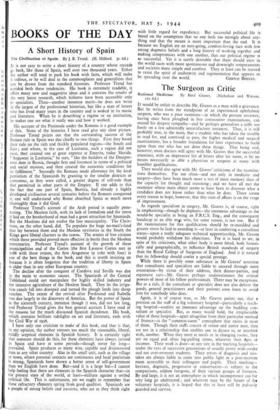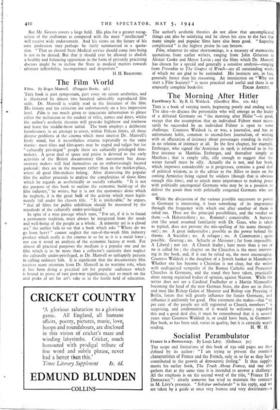The Surgeon as Critic
Rational Medicine. By Basil Graves. (Nicholson and Watson.
I2S. 6d.) IT would be unfair to describe Mr. Graves as a man with a grievance. But he writes from the standpoint of an experienced ophthalmic surgeon, who was a poor examinee—in which the present reviewer, having once been ploughed in five consecutive examinations, can extend his deepest sympathy—and he perhaps generalises a trifle too freely on a few admittedly unsatisfactory instances. Thus, it is still probably true, in the main, that a student who has taken the trouble to read for, and contrived to pass, the higher medical and surgical examinations, has a broader foundation for later experience to build upon than one who has not done these things. That being said, however, most doctors will agree with Mr. Graves that the successful examinee, with an impressive list of letters after his name, is by no means necessarily as able a physician or surgeon as many with humbler qualifications.
They would also agree with Mr. Graves' criticisms of the examina- tions themselves. Far too often—and not only in medicine and surgery—they have been much more a test of mere memory than of the capacity for thought and reasoning ; and we have all met the examiner whose main object seems to have been to discover what a candidate does not know rather than what he does. There seems every reason to hope, however, that this state of affairs is on the verge of improvement.
As regards specialism in surgery, Mr. Graves is, of course, right in emphasising—though he deplores—the enormous advantage to the would-be specialist in being an F.R.C.S. Eng., and the consequent handicap to an able map who, for some reason, is not one. But if the examinations for this qualification should be re-moulded and greater stress be laid in awarding it—or later in conferring a consultant status—upon a really adequate technical apprenticeship, Mr. Graves would probably withdraw his objections. For it is hard to see, in spite of his criticisms, what other body is more fitted, both histori- cally and geographically, to influence British standards of surgery than the Royal College of Surgeons of England. And it is natural that its fellowship should confer a special prestige.
'While there is possibly some substance in Mr Graves' assertion that consultants and specialists arc liable to succeed through mere ostentation—by virtue of their address, their dinner-parties, and expensive cars—Mr. Graves perhaps underestimates the critical powers of most of his fellow professionals. There may be exceptions. But as a rule, if the consultant or specialist does not also deliver the goods, general practitioners and their patients soon learn to avoid him for somebody who does.
Again, it is of course true, as Mr. Graves points out, that a position on the staff of a big voluntary hospital—particularly a teach- ing hospital—confers an immense advantage on the budding con- sultant or specialist. But, as many would hold, the irreplaceable value of these hospitals—apart altogether from their particular method of finance—is the " common-room " atmosphere that exists in most of them. Though their staffs consist of senior and junior men, they are not in a relationship that enables one to dictate to, or interfere with, another. When they meet at meals or in changing rooms, they are on equal and often leg-pulling terms, whatever their ages or incomes. Their work is done—at any rate in the teaching hospitals— under the eyes of successive generations of usually pretty wide-awake and not over-reverent students. Their errors of diagnosis and mis-
takes are always liable to come into public light in a post-mortem room accessible to their colleagues and pupils. Their teaching—
hesitant, dogmatic, progressive or conservative—is subject to the comparisons, seldom foregone, of their various groups of listeners. By and large, it is not an atmosphere in which incompetence can for very long go undetected ; and whatever may be the future of the voluntary hospitals, it is hoped that this at least will be jealously guarded and survive. But Mr. Graves covers a large field. His plea for a greater recog- nition of the craftsman as compared with the mere "intellectual" will receive wide endorsement. And his views on the future of his own profession may perhaps be fairly summarised in a quota- tion. "That an elected State Medical service should come into being is not to be denied. But that it should ever be allowed to abolish a healthy and balancing opposition in the form of privately practising doctors might be to incline the State in medical matters towards ultimate inflexibility, incompetence and despotism."
H. H. BASHFORD.























 Previous page
Previous page